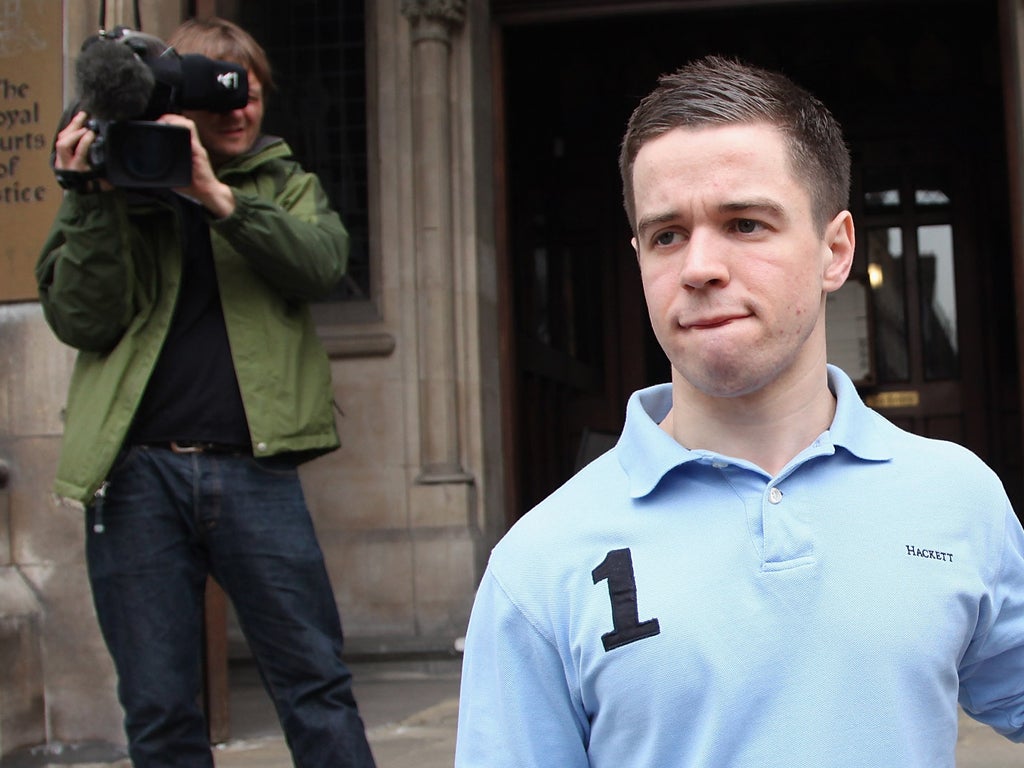
A man's 2005 murder conviction was quashed today after the discovery of photographic evidence on his mobile phone which could have helped his defence case.
Sam Hallam, 24, was at the Court of Appeal - after being dramatically freed on bail - to hear three judges announce that his conviction was "unsafe".
Mr Hallam spent more than seven years behind bars insisting he did not murder trainee chef Essayas Kassahun, 21, who died after being attacked by a group of youths on the St Luke's estate in Clerkenwell, London, on October 11 2004.
He lost an appeal in 2007, but he and his mother Wendy and dozens of supporters packed a London courtroom to hear Lady Justice Hallett, sitting with Mr Justice Openshaw and Mr Justice Spencer, give the court's reasons for overturning the conviction, which was referred by the Criminal Cases Review Commission.
Mr Hallam, of Hoxton, east London, who was found guilty at the Old Bailey in October 2005 and was serving life with a minimum term of 12 years before he was freed by the appeal judges, won his challenge in the light of new evidence relating to his own 3G telephone.
The judges said that for "reasons that escape us", two telephones in Mr Hallam's possession at the time of his arrest were not investigated by the police or his then defence team.
Photographs found on his new 3G phone may have helped him establish his whereabouts on the day of the murder, they said.
In a statement read outside court by Paul May, who led the high-profile campaign to free him, Mr Hallam said: "I don't want anyone else ever to suffer what I've been through since October 2004."
He said: "Justice has long been denied to me but it has now finally prevailed."
Mr Hallam, who was described by his lawyers as the victim of a "serious miscarriage of justice", said in an interview with the BBC that the "whole system" had been unfair.
He added: "The original police investigation was not done properly. They could have done things then to eliminate me, but they never."
Mr Hallam said he "always knew" he was innocent but could do nothing in prison.
"It was horrible. I had to get used to it," he said. "I couldn't do anything. It was only my supporters and family who could help."
Asked if he was angry, he said: "Not yet. I probably will be. I'm still in shock."
Lady Justice Hallett said Mr Hallam's "inability or unwillingness" to say where he was at the time of the murder had "not exactly helped his case".
He exercised his right to silence during interview, on the advice of his legal representative which, with the benefit of hindsight, was perhaps not in his best interests.
The judge said that post-trial analysis showed photos on one of his phones of him with his grandmother and his late father on Monday October 11, and with his friend Timothy Harrington - who said he had not seen Mr Hallam that week - on October 12.
She said: "Given the attachment of young people and the more mature to their mobile phones, we can't understand why someone, either from the investigating team or the defence team, did not think to examine the phones attributable to the appellant.
"One reason proffered for the failure to examine the phones was that, in 2004, the Metropolitan Police did not have the technology in-house to examine 3G phones.
"However, given our limited knowledge, we would have thought that, even a cursory check would have produced some interesting results.
"Further, we would have thought the appellant would have alerted the defence team that he had been taking photos on a new phone which would have helped establish his whereabouts."
She said: "Although this could not establish a positive alibi for the night in question, it raised the distinct possibility that both the appellant and Mr Harrington were mistaken as to the night they were together, and that the alibi was not a concoction with intent to deceive."
The judge added: "Plainly, the appellant, for whatever reason - whether stress or well-intentioned legal advice - did not help himself at interview or in the witness box.
"It was not a case, therefore, where the police or the trial judge could conclude there was no evidence against him. There was evidence for the jury to consider."
She said that the identification evidence was never very satisfactory and there was plainly scope for mistaken identity, without proper independent supporting evidence.
"We now have therefore the real possibility that the failed alibi was consistent with faulty recollection and dysfunctional lifestyle, and not a deliberate lie."
She said: "In our judgment, the cumulative effect of these facts is enough to undermine the safety of these convictions."
Lady Justice Hallett said at the outset of the ruling: "This is yet another tragic example of the effects of gang violence.
"A fight that began for little reason and lasted less than five minutes left one young man dying in the street and several other young men incarcerated for many years."
She concluded by expressing sympathy for the family of Mr Kassahun, who "was by all accounts a charming young man with a great deal to offer".
"They had to cope with his death, the original investigation, the trial and now these proceedings.
"I hope they understand we all have to do our job according to law."
PA
Subscribe to Independent Premium to bookmark this article
Want to bookmark your favourite articles and stories to read or reference later? Start your Independent Premium subscription today.
